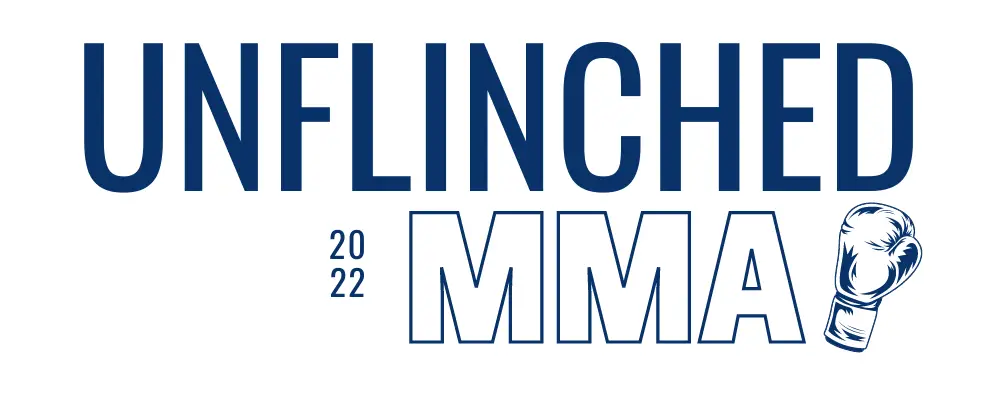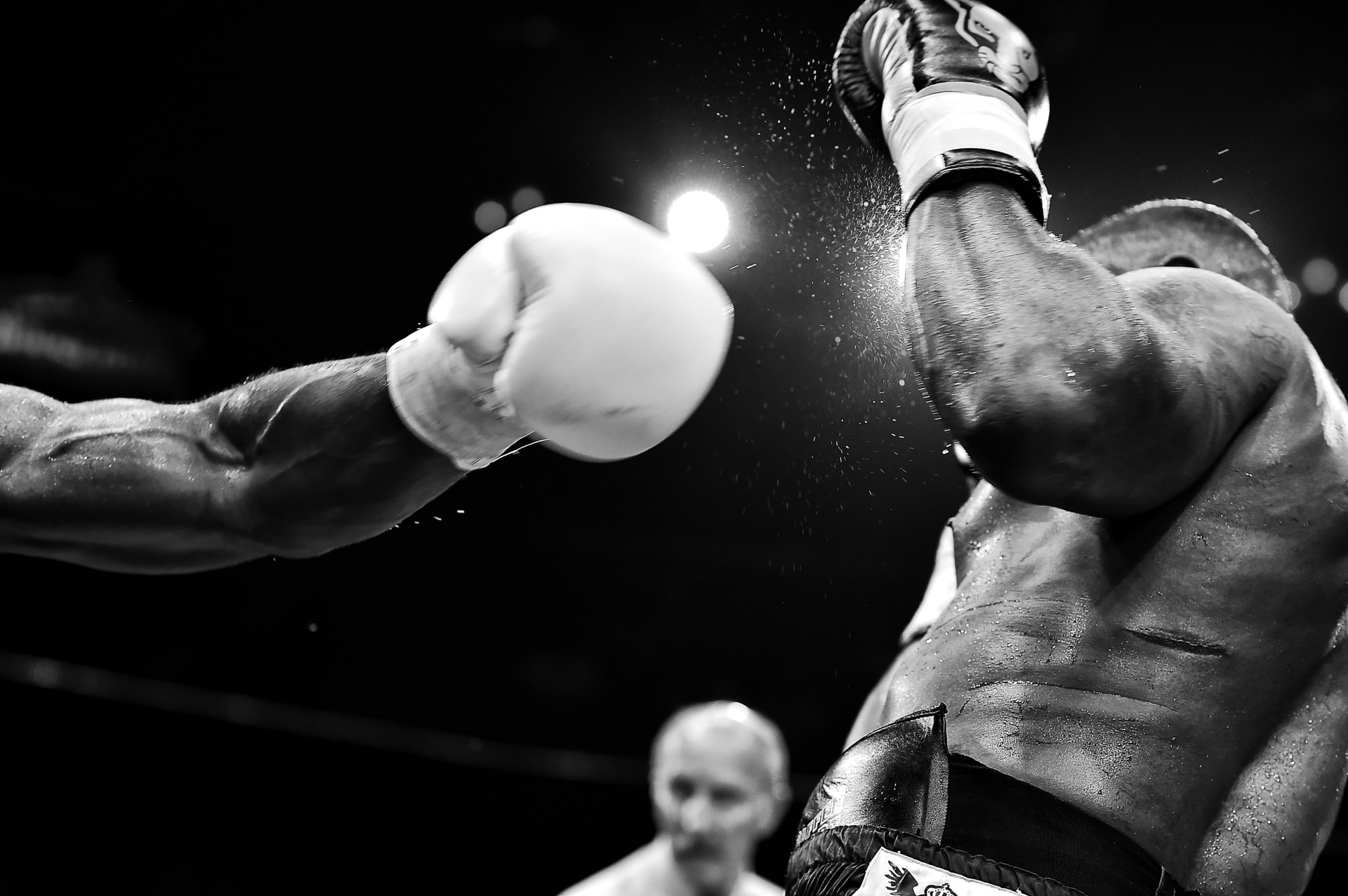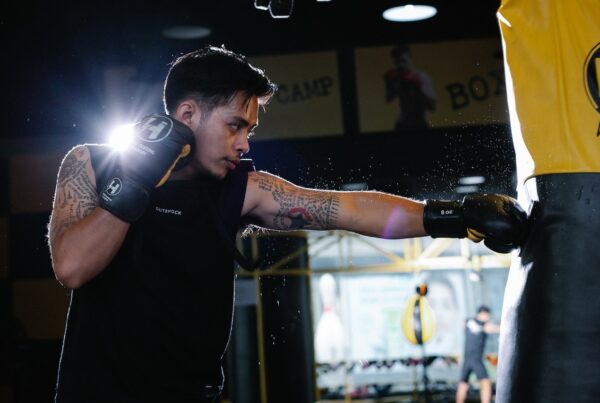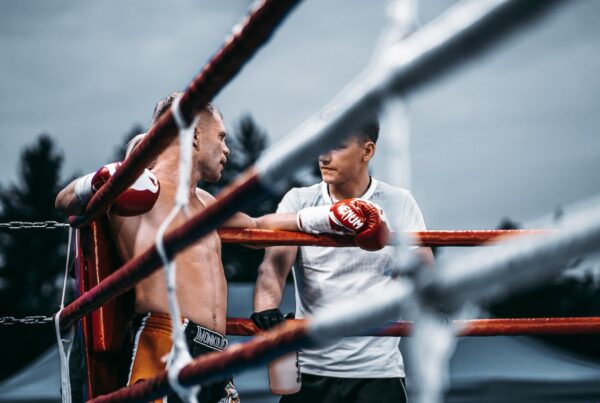The surefire way to stop flinching is through consistent practice and sparring sessions. The more you are used to incoming attacks, the lesser you will flinch. Additionally, make sure to keep your guard up – if you feel safe and ready, you will likely not flinch and can even prepare a counter attack.
Flinching is a natural reaction that everyone has when they are hit by a punch. It can cause you to lose focus and lead to mistakes in the ring. I used to ask the same question when starting out – “How can I stop flinching?”. The thought of incoming punches were scary and my natural reaction just kicked in.
Fast forward a year later, after having countless practise and sparring sessions, incoming punches become second nature. Instead of fearing incoming punches, I now can predict when they will come and even bait my opponents to throw them. In this article, we will discuss the reasons why people flinch and how you could overcome it as well.
Table of Contents
What Causes People to Flinch?
Some of the most common reasons for flinching are fear of pain, fear of embarrassment, and fear of being attacked. Studies have shown that people tend to flinch more when they perceive a threat or when they are experiencing something unpleasant.
This is why it is important for fighters to be aware of their surroundings and to avoid reacting too quickly in fights. By stopping flinching, fighters can help to avoid unnecessary injuries and keep their opponents at a distance.
Each fear I mentioned above can be overcomed through practice. After months of training, I am pretty sure you will get used to the pain, bruises and cuts (you might even enjoy them). Also, fear of embarrassment should be gone after knowing your coaches and fellow peers.
Flinching normally happens when you are new and uncomfortable. Through practise and sparring sessions, eventually, the amount of times you flinch will reduce.
How Do Fighters Not Flinch?
Fighters, (especially the pro fighters) do not flinch because they are already accustomed to incoming punches. They are aware of their surroundings, they understand how punches can be blocked, evaded or even countered – making a punch not scary, and even exciting at times.
It is important for fighters to not flinch in fights. Flinching can be a sign of fear and can make it difficult to stay calm and focused in the ring. A fighter who does not flinch is likely to be more successful in the ring. Every fighter who has trained long enough will eventually stop flinching and the same will apply to you.
That said, you could speed up the process of “not flinching”. I will now share with you 7 strategies and tips to overcome flinching in a fight. Tip: It’s all about experience and mental.

Fighters who have practised for some time are bound to stop flinching because they are used to punches.
8 Strategies for Reducing Flinching In a Fight
1. Practice, practice, practice
To avoid flinching, you need to get used to your environment. The easiest way to get used to something is through consistent practice. By practising and sparring, you will be familiar with every incoming punch, kick and technique – allowing you to expect it and be ready for it.
Remember, repetition is key. By doing this, you’ll be able to fight with more confidence and avoid making mistakes that could cost you the fight. Whether you’re practising in the gym or fighting live, keep practising and you’ll be well on your way to dominating your fight!
This may not sound like effective advice now, but believe me – practising and sparring are the most effective ways to overcome flinching.
2. Be patient and persistent
One of the most important things you can do to stop flinching in a fight is to practice control and restraint. When you are in control of your emotions and actions, it will be much harder for your opponent to make you scared or bait you into making the wrong moves.
When you are in a fight, do not rush into it. This can lead you to make mistakes and receive unnecessary punches (causing you to flinch even more in the future). If you notice that the other person is starting to swing widely, this indicates they are impatient. Punches from impatient fighters are not as scary – allowing you to flinch less.
Also, make sure to keep breathing and relax, it is important to find a rhythm that works for you. Some fighters find that they need to take deep breaths before a fight in order to calm down. Others find that they need more time to relax, so they may choose to take a few deep breaths before the fight and then let things flow from there.
Flinching is a natural reaction that most fighters experience. However, by practicing restraint and controlling your reactions, you may be able to stop flinching altogether.
3. Develop You Footwork
By keeping your balance and moving correctly, you’ll be able to land and evade more punches – which will ultimately increase your confidence and reduce your flinching.
With great footwork, you will be able to move in and out of your opponent’s range at will. This allows you to be more comfortable during a fight. Thus, reducing the fear of getting punched and flinching.
Related article: Ultimate Guide To Rhythm In Boxing: 10 Improvement Tips
4. Keep Your Heads Up
Make sure to keep your hands and guards up at all times. Protecting your face is the most important thing to reduce flinching. Most fighters flinch even more when a punch is directed to their face. Keep your guards up at all times and punches won’t look as scary.
It may seem easy, but most fighters will forget to keep their guards up during a fight. This will come with practice and more sparring. Don’t get frustrated and discouraged if you forget to keep your guards up and get a clean hit. Nobody does it right on the first try.
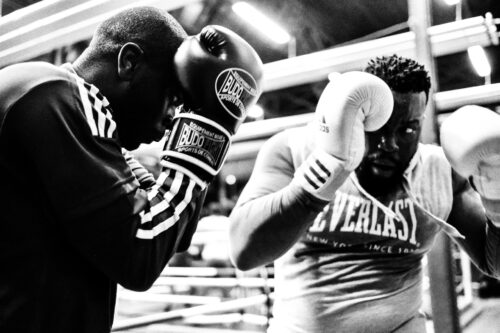
Always keeping your guard up is a great way to feel safer and reduce flinching.
5. Take Time to Breathe and Relax
Ensure you are relaxed and breathing well during a fight. When you are relaxed, you are more focused on your opponent – allowing you to keep your distance well and anticipate any incoming punch to avoid flinching.
It is important to take time to breathe and relax when you are in a fight. When you are stressed, your body will react differently in a fight. Breathing deeply will help to calm your body and ease the adrenaline rush. Relaxing your muscles will also help you focus and stay calm during a fight.
6. Understand Your Opponent’s Rhythm
Understanding your opponent’s rhythm allows you to predict incoming punches. When you know a punch is coming, it will not be as scary and you will less likely flinch.
Rhythm is an advanced topic in any martial arts (especially boxing). If you are a beginner, your opponent is most likely punching or kicking in basic and repeated patterns. Realise this and predict what’s coming.
For example, in boxing, Jab-Jab-Cross combo is very common. If your opponent is a beginner, he or she is going to throw out these combos without realising. Anticipate these combos and predict the next attack. When you know what’s coming, how scary could it be?
Related article: 8 Tips To Predict Incoming Punches: Where To Focus In Boxing
7. Prepare & Strategize For Your Fight
Preparing and strategizing for your fight is another good approach to reduce flinching. If you know your opponent well, you could anticipate his moves and prepare in advance what you could do.
For example, by closely watching your opponent, you could notice typical weaknesses like running out of breath after some time. Knowing this, you could focus solely on defence in the early rounds, and switch to offence when your opponent is tired.
The point is, if you have a strategy in place, you are less likely to be afraid and flinch. Just remember your strategy and focus on executing that strategy. With this mindset, you should be less afraid and reduce flinching.
8. Confront your fears head-on
There’s no escaping fear in a fight, but that doesn’t mean you have to give in to it. Instead, face it head-on and use it as an opportunity to better prepare for the challenge ahead. Doing so will help you remain calm under pressure, which will ultimately lead to victory in any physical confrontation.
This last tip applies to all fighters in all stages. No matter if you are a beginner or a pro, the fear of getting punched will always exist. Confront it head on instead of avoiding it.
How Do You Mentally Prepare For a Fight?
Flinching is all about your mind. Aside from the 8 strategies above, it’s also important to always mentally prepare for a fight – be it regular sparring or a pro match. Here are ways to mentally prepare for a fight so that you never lose the mind game again. Remember, when you win the mental game, you already win half the fight.
- Visualise the outcome you want.
Visualise yourself achieving your desired outcome, and take steps to make that happen. Practise your skills regularly, stay calm and focused during situations that typically cause flinching (like being suddenly attacked), and keep in mind that any experience can help you become a better fighter.
- Do not overthink things.
It is tempting to overanalyze every move your opponent makes, but this can actually lead to anxiety and fear. Instead, try to relax and let the fight flow naturally. If something feels risky or uncomfortable, that is probably because it is! However, by staying calm and focused during a fight, you will be less likely to make any mistakes and lose because of them.
- Practice self-control and breathing techniques.
Many fighters find that practising certain breathing exercises or controlling their emotions through visualisation help them prevent “stop flinching.” By learning how to control these things in training, you will be better prepared for any difficult situations in a fight.
- Expect the unexpected and be flexible.
No matter how much practice you have had, there are always going to be moments in a fight when things don’t go as planned – this is simply part of the game! Be prepared for anything – whether it’s an unexpected attack from your opponent or a sudden gust of wind that knocks you down! Being adaptable will allow you to remain calm under pressure and keep your focus on the task at hand.
- Stay positive even when times are tough.
Although it may seem difficult at times, staying positive will ultimately lead to a better performance in a fight. Don’t dwell on past failures or disappointments – instead, focus on what you can control (like breathing). Believe that you can win – then put all your energy into doing just that!
- Be confident in yourself and your abilities.
In order to be successful in any fight or competition, it is important to be confident in yourself and your abilities. When you are confident, you will not flinch when an opponent tries to hurt you, and this will give you a psychological advantage. If you are always worrying about being hurt, the chances of winning diminish significantly. Instead, focus on using your skills and techniques to defeat your opponent.
Remain calm and collected no matter what happens and know that you can do anything if you put your mind to it. Although you cannot control whether or not your opponent flinches, you can work hard to avoid doing so.
Conclusion
Flinching is natural and any fighter has this problem at some point in their journey – you are not alone! Don’t be discouraged by this and instead, understand how to overcome it.
I hope this article has been useful in your martial arts journey.


